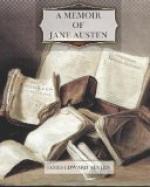thought it tame and flat, and was desirous of producing
something better. This weighed upon her mind,
the more so probably on account of the weak state
of her health; so that one night she retired to rest
in very low spirits. But such depression was
little in accordance with her nature, and was soon
shaken off. The next morning she awoke to more
cheerful views and brighter inspirations: the
sense of power revived; and imagination resumed its
course. She cancelled the condemned chapter,
and wrote two others, entirely different, in its stead.
The result is that we possess the visit of the Musgrove
party to Bath; the crowded and animated scenes at the
White Hart Hotel; and the charming conversation between
Capt. Harville and Anne Elliot, overheard by
Capt. Wentworth, by which the two faithful lovers
were at last led to understand each other’s feelings.
The tenth and eleventh chapters of ‘Persuasion’
then, rather than the actual winding-up of the story,
contain the latest of her printed compositions, her
last contribution to the entertainment of the public.
Perhaps it may be thought that she has seldom written
anything more brilliant; and that, independent of
the original manner in which the denouement
is brought about, the pictures of Charles Musgrove’s
good-natured boyishness and of his wife’s jealous
selfishness would have been incomplete without these
finishing strokes. The cancelled chapter exists
in manuscript. It is certainly inferior to the
two which were substituted for it: but it was
such as some writers and some readers might have been
contented with; and it contained touches which scarcely
any other hand could have given, the suppression of
which may be almost a matter of regret. {167}
The following letter was addressed to her friend Miss Bigg, then staying at Streatham with her sister, the wife of the Reverend Herbert Hill, uncle of Robert Southey. It appears to have been written three days before she began her last work, which will be noticed in another chapter; and shows that she was not at that time aware of the serious nature of her malady:—
’Chawton, January 24, 1817.
’MY DEAR ALETHEA,—I think it time there should be a little writing between us, though I believe the epistolary debt is on your side, and I hope this will find all the Streatham party well, neither carried away by the flood, nor rheumatic through the damps. Such mild weather is, you know, delightful to us, and though we have a great many ponds, and a fine running stream through the meadows on the other side of the road, it is nothing but what beautifies us and does to talk of. I have certainly gained strength through the winter and am not far from being well; and I think I understand my own case now so much better than I did, as to be able by care to keep off any serious return of illness. I am convinced that bile is at the bottom of all I have suffered, which




